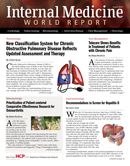Probiotics Ineffective in Preventing Antibiotic-associated Diarrhea in Elderly
Although previous research has found probiotics can prevent antibiotic-associated diarrhea and Clostridium difficile diarrhea, a study from researchers in the United Kingdom and Germany reported contradicting results.

Although previous research has found probiotics can prevent antibiotic-associated diarrhea (AAD) and Clostridium difficile diarrhea (CDD), a study from researchers in the United Kingdom and Germany reported contradicting results.
Although AAD occurs commonly in older people admitted to the hospital and within 12 weeks of exposure to broad-spectrum antibiotics, the cases caused by C. difficile infection may result in severe diarrhea and death. CDD represents roughly 15% to 39% of all AAD cases.
The purpose of the study, published in Health Technology Assessment from the UK’s National Institute for Health Research, was to determine the clinical and cost effectiveness of using a high-dose, multistrain probiotic to prevent AAD and CDD in hospital patients age 65 years and older.
The researchers recruited 2,981 individuals with 1,493 randomly selected to participate in the probiotic arm of the trial and 1,488 allocated to the placebo arm. The median age was 77.1 years. Comorbidities were common among the patients: 54.6% suffered from hypertension, 24.1% from chronic obstructive pulmonary disease, and 22.9% from diabetes mellitus. Penicillin were the most commonly prescribed antibiotics.
Participants took either vegetarian capsules containing 2 strains of lactobacilli and 2 strains of bifidobacteria or placebo daily for 21 days. Eligible patients were 65 years or older; without pre-existing diarrheal disorders or recent CDD; were not at risk of probiotic adverse effects; and had been exposed to at least one antibiotic.
In the 2 trial arms, 99.6% of participants took at least one dose of the trial interventions, and 52.5% completed the full 21-day course.
Not only was the frequency of AAD similar in both arms — 10.8% in the probiotic and 10.4% in the placebo — but also the frequency and duration of gastrointestinal symptoms during AAD were similar, according to the researchers. CDD occurred in just 0.8% of participants in the probiotic and 1.2% of patients in the placebo arms.
Furthermore, the total healthcare cost per patient was almost identical. In the probiotic arm, the cost was GBP 8,020 compared to GBP 8,010 in the placebo arm of the trial.
“We found no evidence that probiotic administration was effective in preventing AAD,” the authors concluded. “Although there was a trend towards reduced CDD in the probiotic arm, on balance, the administration of this probiotic seems unlikely to benefit older patients exposed to antibiotics.”
However, they admit that alternative probiotic preparations may prevent AAD more effectively. The investigators recommend a better understanding of the mechanisms underlying both AAD and CDD and how they vary in specific populations.
